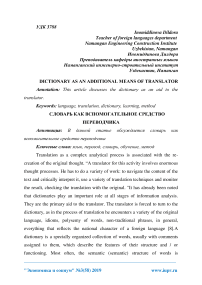Dictionary as an additional means of translator
Автор: Inomiddinova D.
Журнал: Экономика и социум @ekonomika-socium
Рубрика: Основной раздел
Статья в выпуске: 3 (58), 2019 года.
Бесплатный доступ
This article discusses the dictionary as an aid to the translator.
Language, translation, dictionary, learning, method
Короткий адрес: https://sciup.org/140241772
IDR: 140241772
Текст научной статьи Dictionary as an additional means of translator
вспомогательное средство переводчика
Translation as a complex analytical process is associated with the recreation of the original thought. “A translator for this activity involves enormous thought processes. He has to do a variety of work: to navigate the content of the text and critically interpret it, use a variety of translation techniques and monitor the result, checking the translation with the original. "It has already been noted that dictionaries play an important role at all stages of information analysis. They are the primary aid to the translator. The translator is forced to turn to the dictionary, as in the process of translation he encounters a variety of the original language, idioms, polysemy of words, non-traditional phrases, in general, everything that reflects the national character of a foreign language [8].A dictionary is a specially organized collection of words, usually with comments assigned to them, which describe the features of their structure and / or functioning. Most often, the semantic (semantic) structure of words is commented, i.e., explanations (interpretations) of their meanings and uses are compared to words in a dictionary, but many other types of comments are possible. In addition to words, objects of a vocabulary description can be their components (such as morphemes dictionaries, for example), phrases of various types, stable maxims - proverbs, sayings, quotes, etc. There are also dictionaries in which there are no special comments for each unit of the dictionary description. The term “dictionary” also refers to the entire set of words of a certain language (in other words, its vocabulary) and is opposed to the term “grammar”, denoting a set of rules for constructing more complex language expressions from words.
Dictionaries may be useful to the translator for several purposes. The dictionary does not provide a ready translation of the word, but it indicates in which direction the context-related meaning should be sought. The main purpose of the dictionary is to reveal the main direct and contextual meanings of words for their correct use in speech. Dictionaries, as we know them, are of relatively late origin.
They belong to the period that followed the modern discovery of typography in the middle of the 15th century. However, in previous centuries, people made up the glossaries; these were handwritten lists of foreign and unusual words that were encountered in manuscripts in ancient languages, especially the writings of Greek and Latin classics. A scientist or just a copyist, having determined the meaning of an unfamiliar word, wrote it between the lines or in the margins; A separate such litter is called Glossa. The earliest glosses are known from the deepest antiquity (for example, the Sumerian glosses of 25 c.BC.). From a functional point of view, the so-called metalinguistic function of a language was realized in the glosses, that is, using the language to discuss the language itself, and not the external world. Handwritten glossaries were in constant demand. Many copies were made from them, and later, when books became cheaper with the advent of book printing, dictionaries were among the first printed products.
"Экономика и социум" №3(58) 2019
Список литературы Dictionary as an additional means of translator
- Antipov A.M. The rhythmic system of English speech. M., 1984.
- Arnold I.V. The style of modern English. (Decoding Stylistics). L., 1973.
- Bogin G.I. Speaking in a foreign language as one of the objects of teaching practical stylistics in a language university//Inostr. lang in higher. wk 1971.
- Peshkovsky A.M. Selected Works. M., 1959.
- Smirnitsky A.I. Lexicology of English. M., 1956.
- Khaleeva I.I. Fundamentals of the theory of learning to understand foreign language speech. M., 1989.


